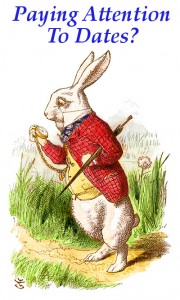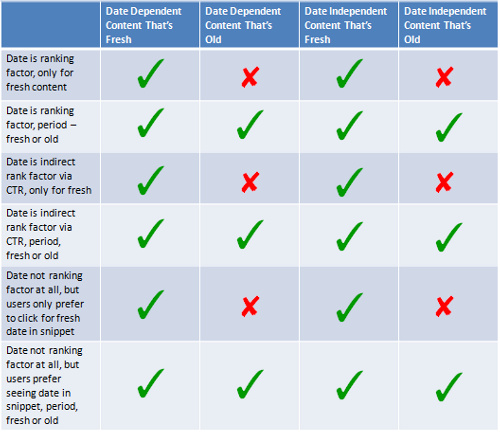 Last week’s announcement that Google has tweaked algorithms to rank fresher content higher in many cases (purportedly 35%! more often) isn’t a complete surprise for those who follow SEM Clubhouse. I previously wrote some on how Google may rank pages with dates higher and many of us in the SEO field have already known that freshness is an important factor for blog posts, news articles, and some other types of content such as images. But this current announcement indicates that the search engine views recency to be more important for a wider variety of content and topics than it was previously.
Last week’s announcement that Google has tweaked algorithms to rank fresher content higher in many cases (purportedly 35%! more often) isn’t a complete surprise for those who follow SEM Clubhouse. I previously wrote some on how Google may rank pages with dates higher and many of us in the SEO field have already known that freshness is an important factor for blog posts, news articles, and some other types of content such as images. But this current announcement indicates that the search engine views recency to be more important for a wider variety of content and topics than it was previously.
So, what does this mean in terms of displaying dates on pages as I earlier explored? Does the recent algo tweaking change my earlier recommendation that displaying dates on webpages may help rankings?
As you may recall, Michael Gray and I differed on this point — he suggested that one should opt out of having dates on pages because Google displays them willy-nilly in snippets, and they may frequently prejudice users from clicking through if other content with more recent dates is available in the same search results page. In contrast, I argued that Google’s usability testing apparently found that users often prefer to see the dates in the SERP listing snippets, and that factoid makes it an element that Google’s algorithm might prefer slightly for ranking purposes. Even if the algorithm didn’t give advantage to pages with dates, their research indicates that it might still increase user CTR to the webpage, which can indirectly improve rankings over time. Both Michael and I provided caveats, however, and acknowledged that their are exception cases.
In that earlier post, I provided a decision matrix which I believe supports my general stance that having the dates is likely beneficial in more cases than not. In it, the green check marks are cases where having the date is probably advantageous, while the red exxes indicate cases where it might not be helpful:

Now that Google has apparently bumped up the “freshness factor” in ranking signals as slightly more important than before, I believe it further supports my stance that having the date on pages is beneficial for most types of content. By making this change to the algorithm (and announcing it publicly), Google has signaled that this is particularly important. Therefore, having the date in the snippet is likely even more important to searchers.
Now, you might be thinking at this point that you have older or even stale content, so you will opt out of the date in order to avoid some perceived penalty of the application of the freshness factor. I’ll tell you flat out that this particular reasoning is illogical: Google has a separate factor which they independently derive to decide a document’s initial publication date. It’s probably based upon the date when they index the webpage for the very first time. This document inception date is *not* affected by the date printed on the webpage, so you can’t fool the algo by declining to display the date or lying about the publication date! (Search Engine Land further verified this in chatting with Google about their freshness ranking announcement.) In fact, if you frequently change the date you print on the page without actually changing the page’s content, you could get dinged in your quality score — I would not try it.
One thing you could do is periodically review your content and update it with postscripts or revision notes at the end, and THEN change the “last updated” date you display on the page to reflect the day of the change. This method is, of course, costlier, and requires some actual investment in ongoing quality improvement. But, I’d say that it’s the valid way to optimize in terms of date and freshness, and there’s likely no good shortcut for this signal.
Finally, if you’re thinking about abruptly changing all of the URLs of your article pages to periodically start the clock ticking once more for the document inception dates, you should know that one of the prime ranking factors that’s been in play for years now is an advantage given to pages with a longer legacy. Pages which have been around for a longer period of time on stable URLs have had some ranking advantage in Google SERPs. The question now is, how much advantage? Does the advantage of recency now outweigh the advantage of longevity?
If you dump all your legacy URLs you might find out — but the answer may not be to your liking.
In truth, I suspect that this freshness factor tweak is likely somewhat subtle and the actual impact may be fairly light for most sites. While the figure of 35% of searches being changed sounds impressive and impactful, it could be as simple as one page out of 10,000 getting bumped up to the first page. It doesn’t mean that 35% of the first page of SERPs will alter. Listings that are bumping in and out of positions ten and eleven likely wouldn’t notice a change at all.









Nice summary of the “freshness announcement”. Sounds like publishers do well to revisit key posts on a regular basis and update them with fresh content.
Another debate has been do you remove or keep dates on post, not so much for any sort of SEO benefit, but for a social benefit. What impact does it have on people with actual eyeballs, who read your content.
What are your thoughts on that?
Regards,
Travis
Travis, I confess I often find myself searching for the dates when I’m on news articles and blog posts. I know I likely do this more than the general population, because I’m frequently researching content for articles I’m writing, but I also do it to get an idea of whether technical info is current/valid, or to understand when something happened.
For non-blog posts and non-articles, I don’t care so much for dates. So, from an anecdotal sense, I believe Google’s usability studies that show consumers are often looking for dates.
I suspect that even for non-blog posts and non-news articles, dates can have an importance at times, such as when copyright dates on sites are extremely out-of-date. Such a thing could easily be a cue that signals to visitors that the site is stale, poorly-maintained, etc.